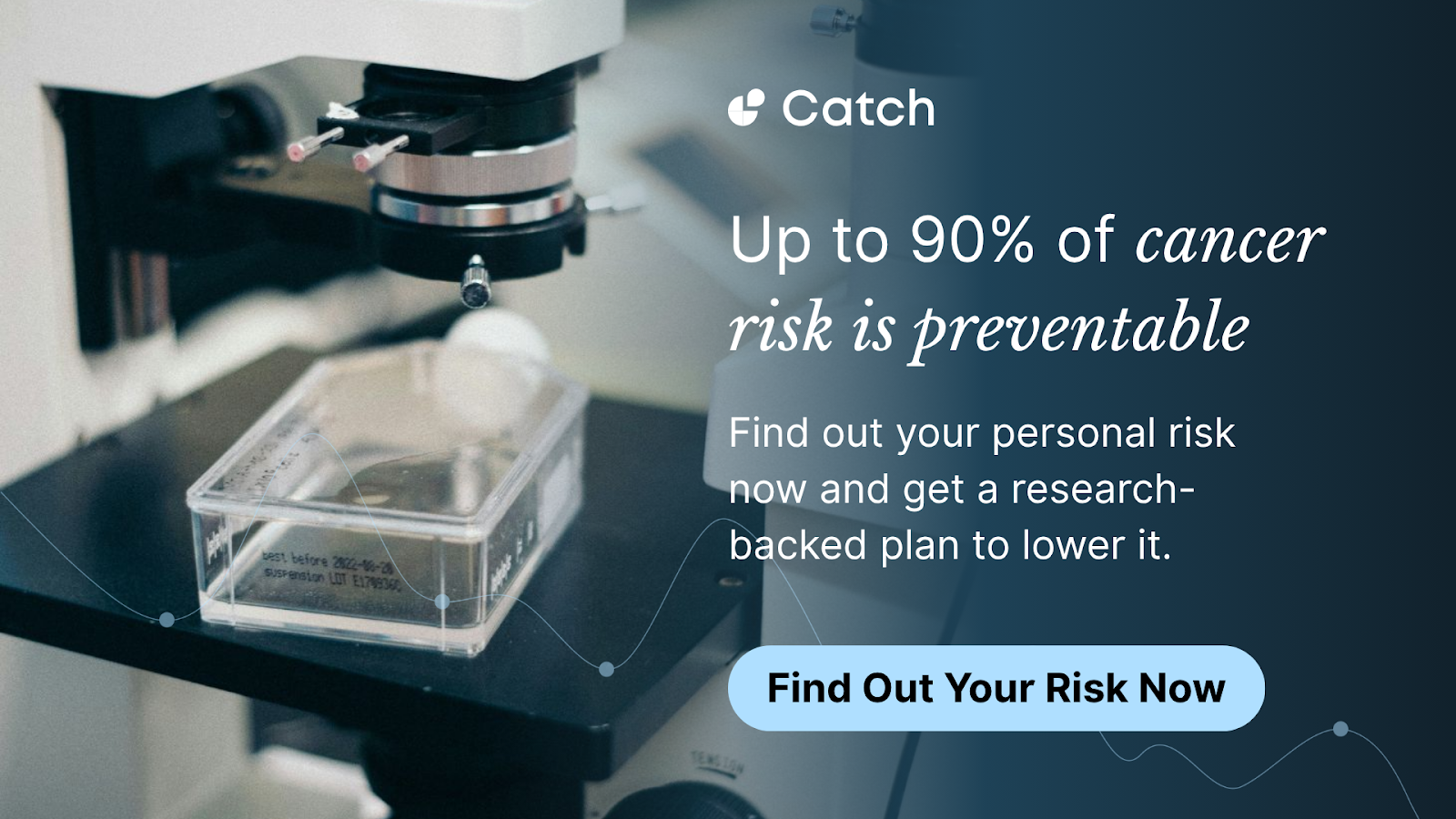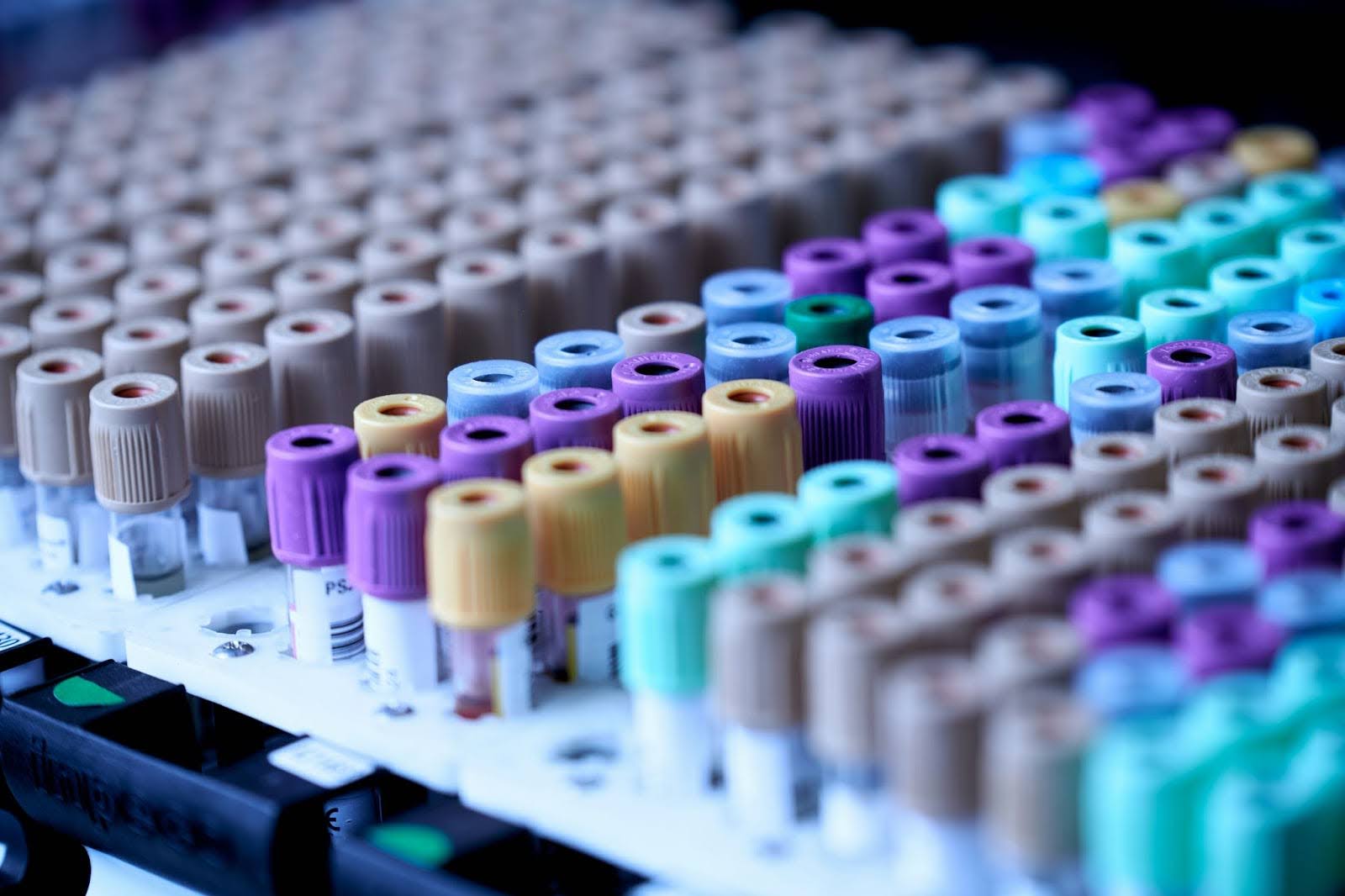Key Takeaways:
- Blood tests for cancer detection are not foolproof: Issues such as false positives and negatives are still prevalent and can be challenging to cope with emotionally.
- Blood tests can play a crucial role in early detection and survival. In some cases, they can identify early-stage cancers, potentially improving survival rates by enabling timely intervention.
- A combined approach to cancer prevention is ideal. For a comprehensive cancer screening strategy, blood tests should be integrated with other diagnostic methods, like imaging and biopsies.
Early detection is key for increasing your chances of surviving a cancer diagnosis. In recent years, there have been significant advancements in cancer detection and treatment, including new screening methods. Blood tests are just one of many tools we have. So, can cancer be detected in blood work? Perhaps more importantly, how accurately does blood work show cancer?
Here at Catch, we’re committed to helping you reduce your cancer risk through knowledge and action. Catch offers comprehensive risk assessments for all 21 major cancers, such as breast, prostate, lung, and colon cancer. We craft personalized screening protocols and prevention plans from there, grounded in the most up-to-date research.
In this article, we’ll unpack the potential of blood tests for cancer detection. Our mission is clear: We aim to arm you with the tools to fight cancer before it has a chance to strike.

Introduction To Cancer Detection Via Blood Tests
The idea of detecting cancer with a simple blood test is exciting, and it’s true that blood tests can play an important role in this process. Before we get further into the topic, it is important to review a couple of facts.
First, there is no “single” blood test that will tell you, across the board, if you have cancer. Instead, blood tests look for certain markers, like high or low levels of certain substances, that can be a sign of cancer. Keeping this in mind, various blood tests can aid in cancer detection. The blood test a provider orders will depend on the type of cancer you’re concerned about.
Additionally, it is possible to have normal blood tests even if you do have cancer. Good blood work doesn’t mean that nothing is wrong for sure, and many types of cancer can go undetected for a very long period of time with few to no notable symptoms.
Types Of Blood Tests Used In Cancer Detection
Multiple types of tests and procedures are making waves for their potential to spot cancer. Here are some of the types of blood tests that can be used in cancer detection.
Tumor marker tests
Look for specific proteins or substances in the blood produced by cancer cells. Examples include PSA for prostate cancer and CA-125 for ovarian cancer. Prone to false positives, which can lead to unnecessary anxiety and medical procedures. It’s useful when combined with other diagnostic tests.
Circulating tumor cell (CTC) tests
Detect cancer cells that have entered the bloodstream. Useful for monitoring disease progression or recurrence rather than initial detection. Limited by the rarity of CTCs in the early stages of cancer.
Liquid biopsy tests
Analyzes circulating tumor DNA (ctDNA) released by tumors into the blood. Represents a non-invasive and cutting-edge method for potential early cancer detection. Helpful in detecting specific cancer mutations. Technology is still relatively new and not universally accessible due to cost, and it may not detect all cancer types, particularly in early stages.
General Considerations
No blood test provides a perfect diagnosis for all cancer types. Sensitivity and specificity can differ based on cancer type, stage, and individual patient factors. Blood tests are often used as part of a comprehensive diagnostic approach rather than in isolation. Advances in medical science and technology occur frequently. Therefore, it is always recommended to consult the latest peer-reviewed research or medical guidelines for the most up-to-date information.
Advantages Of Early Cancer Detection Via Blood Tests
The science is still evolving, but the potential is undeniable. Firstly, early detection through blood tests can improve survival rates. The numbers don’t lie: When cancer is caught in early or localized stages, the five-year survival rate for many types, like colorectal cancer, can exceed 90%. Wait until stage 4, and those odds plummet. A blood test that flags abnormalities early gives you a head start, allowing for interventions when the disease is most treatable, often before symptoms kick in.
Then there’s the non-invasive factor. Traditional diagnostics, such as biopsies or imaging, can be challenging for multiple reasons. Test preparation, radiation exposure, and discomfort are all significant causes of nervousness for people undergoing many types of cancer screenings. Blood tests? A quick draw, a vial or two, and you’re done. Blood tests can be easier on the body and mind, and they take less time out of your day than most other tools used for cancer detection.
There’s also the cost angle. A blood test might seem like a pricey upfront investment, but stack it against the financial and emotional toll of advanced disease, and it is an easy choice. Late-stage cancer can upend your life entirely, and treatment can become more difficult the longer it goes undetected. The earlier you know, the more options you have. In a battle as brutal as cancer, every advantage counts.
Possible Drawbacks of Blood Tests
Blood tests for cancer hold potential, but they face significant challenges. Accuracy is a major concern, as false positives and negatives are possible. Moreover, they may not be able to identify the cancer's location or stage, which complicates the diagnostic process.
Financial and accessibility barriers also prevent widespread adoption; these tests can be expensive and aren't always covered by insurance or available in every medical facility. While they represent a step forward in cancer diagnosis, blood tests are not a standalone solution and should be considered as one part of a comprehensive approach to cancer detection.
Despite these constraints, when used alongside standard diagnostic methods, blood tests significantly enhance the accuracy and timeliness of cancer detection. Researchers continue to work on improving the reliability of blood tests, but it's critical to maintain realistic expectations about their capabilities in the current healthcare landscape.

Blood Tests As Part of A Comprehensive Cancer Screening
Blood tests now play an increasingly significant role in early cancer detection, and it is our hope that these noninvasive screening tools will continue to expand. However, as we’ve covered, blood test accuracy varies. To counter these limitations, it’s essential to incorporate blood tests within a comprehensive screening approach. This includes combining test results with procedures and strategies such as biopsies, imaging technologies, genetic screenings, and personal health assessments to obtain a reliable diagnostic impression.
Until advancements are perfected, blood tests should be regarded as one of several diagnostic tools rather than a solitary solution for cancer screening. Those who want to know more about how to prevent cancer should stay informed on things like lifestyle, yes, but it is also crucial to learn about things like the age at which you should start getting screened for certain types of cancer. Talk with your doctor, and if your family history is available to you, make sure that your healthcare provider is aware of it.
Take Control Of Your Cancer Risk with Catch
With Catch, you’re not just hoping for the best. You’re arming yourself with data-driven insights to reduce cancer risk head-on. Here’s why you should act now and become a member:
- Comprehensive Risk Mapping: Start with an in-depth assessment that lays out your unique cancer risk landscape. No guesswork, just hard facts.
- Actionable Prevention Plans: From supplements to lifestyle tweaks, we provide precise steps to lower your risk and track your progress in real-time.
- Continuous Updates: We’ll update your prevention plan as the research and your health evolve. This way, you can stay informed and proactive with less effort.
Early detection can save your life, and Catch is here to guide you through it. Don’t wait for symptoms to strike. Take the reins today and sign up for Catch.

Final Thoughts
So, does blood work show cancer? It can, but it’s not that simple. While technology is advancing, offering glimpses of a future where a simple blood draw could unmask cancer before it takes hold, we’re not quite there yet. The data shows promise, but limitations in sensitivity and specificity remind us that these tests are not a replacement for other screening types.
Yet, this is where proactive steps can make all the difference. At Catch, we’re committed to reducing cancer risk by empowering individuals with comprehensive risk assessments for all 21 major types of cancer. We craft personalized prevention plans that involve the latest research and actionable steps you can take to protect your health.
From tailored screenings to lifestyle adjustments, Catch helps you navigate your unique risk map, tracking progress in real-time. Become a Catch member today to stay ahead of the curve and turn uncertainty into action.
Read also:
Frequently Asked Questions About Blood Tests for Cancer Detection
How does a blood test detect possible cancer?
Blood tests detect cancer by identifying abnormalities in the blood that are associated with malignant growth. They can detect elevated levels of certain proteins (such as tumor markers), fragments of tumor DNA shed into the bloodstream, or even whole cancer cells circulating through the system.
Are blood tests for cancer diagnosis 100% accurate?
No, blood tests for cancer are not 100% accurate. While they can be powerful tools for detecting potential issues, false positives and negatives do occur. Factors such as the type of cancer, its stage, and individual biology can impact the results.
What types of cancer can be detected by blood tests?
Blood tests can help detect a range of cancers, including breast, prostate, lung, colon, and liver, among others. Specific tests target biomarkers linked to particular cancers, though no single test covers every cancer type.
How early can a blood test detect cancer?
Some blood tests can detect cancer in its early stages, sometimes even before symptoms appear, by identifying subtle biomarkers or genetic changes. However, the effectiveness depends on the cancer type and the test’s sensitivity.
Is a blood test enough to diagnose cancer?
No. Rarely does a blood test provide a definitive diagnosis. A blood test can raise red flags for cancer, and it is a valuable tool in cancer detection, but confirmation usually requires imaging scans, biopsies, or other diagnostic procedures.
What markers in blood indicate cancer?
Blood tests look for various markers that may suggest cancer, including tumor-specific proteins (like PSA for prostate cancer or CA-125 for ovarian cancer), circulating tumor DNA (ctDNA), and abnormal blood cell counts. The blood test you get will depend on the type of cancer a provider is looking for.
Which blood tests are used to monitor cancer progression?
Tests like tumor marker panels, complete blood counts (CBC), and liquid biopsies are commonly used to monitor cancer progression, recurrence, and overall health in diagnosed patients. They are often ordered to track changes over time to gauge treatment effectiveness.
What is the role of a blood test in cancer prevention?
Blood tests can help you monitor your overall health and may aid in the early detection of cancer. Staying on track with physical activity, the cancer prevention diet, and regular screenings can also help you protect your health.
Sources:
- National Cancer Institute (n.d.). Tests and Procedures Used to Diagnose Cancer. https://www.cancer.gov/about-cancer/diagnosis-staging/diagnosis
- American Cancer Society (n.d.). Survival Rates for Colorectal Cancer. https://www.cancer.org/cancer/types/colon-rectal-cancer/detection-diagnosis-staging/survival-rates.html
- MedlinePlus. (n.d.). What is circulating tumor DNA and how is it used to diagnose and manage cancer? https://medlineplus.gov/genetics/understanding/testing/circulatingtumordna/










.svg)



